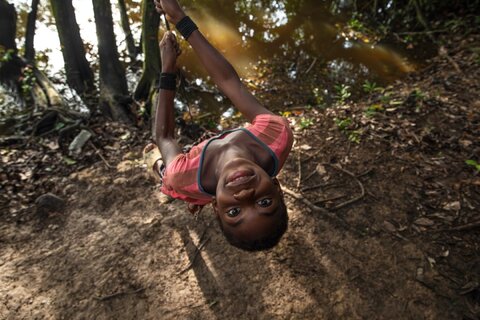Christmas in the time of climate change

Christmas is a time that Cesaria Illescas Gonzales, better known by her nickname Chepita, looks forward to every year. But last year, when heavy rains and floods washed away her land and livelihood, her big Christmas meal was the last thing on her mind.
Bolivia is considered the country most vulnerable to the effects of climate change in South America. In February, the Bolivian government declared a national emergency in more than 80 municipalities due to floods.
The Moreta community in Entres Rios, where Chepita lives, was not spared.

Most of the accompanying vegetables used to make picana — the traditional Bolivian Christmas Eve broth of beef, lamb, chicken, duck, and various spices — come from Chepita's own crop, which this year was destroyed as a result of severe climate variations.
Fortunately, however, this Christmas Eve 30 of her family members will still be able to from Santa Cruz, Yacuiba and Tapacari to her home in Moreta to cook her mother's traditional picana recipe together. Most of the family helps with the cooking — not just because it takes time, but to spend a rare moment in the year when they're all together.
Cash to rebuild
As part of the World Food Programme(WFP)'s work in Bolivia, Chepita is one of the 12,000 people who have had the opportunity to help rebuild their communities in exchange for cash transfers. This includes the rehabilitation of Chepita's farm where her crops grow once more. With the cash she receives, she can go to the local market in Entre Rios to buy the ingredients she does not grow — beef and lamb — to ensure her picana will turn out exactly like her late mother taught her years ago.

WFP distributed cash which families could use to meet their needs — from basic hygiene items to picana ingredients — until they were able to rehabilitate their lands and grow and sell their produce again. This does not just help people meet basic necessities but also to maintain the lifestyle they are used to.
The organization also contracts local retailers where people can shop, which boosts the local economy.
A Christmas wish
When the clock strikes midnight on Christmas eve, Chepita and her family will share hugs, after sharing the meal they spent all day preparing together.
When asked what does she hope for this Christmas, she says, "I hope to have all that I need, including good returns of my crops to provide for my family and to have savings for the future. And finally, I wish that next year the climate doesn't hit us as much as the past years."
What will you be wishing for this Christmas?

